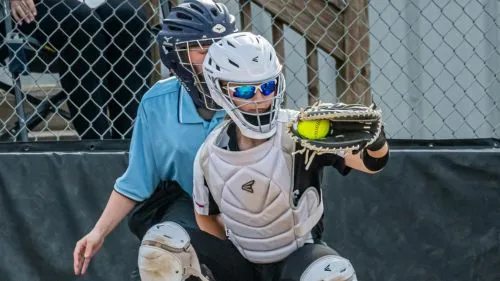In this article, we’re going to go over how to handle self-doubt both before and during games. The way we are going to look at this is in three parts:
-
Building ongoing confidence to reduce the chances of self-doubt.
-
Handling self-doubt right before a game starts.
-
Managing self-doubt during competition.
Building Confidence to Limit Self-Doubt
The first step in reducing self-doubt is to consistently build your confidence. There are two main ways to do this:
1. Mental Training Tools
You want to be proactive about strengthening your confidence. That means using tools such as a self-talk routine and visualization.
-
Self-talk routine:
This involves coming up with a list of 10 positive or confident statements and reviewing them every single day. The goal is to retrain your brain to think in a more confident way. As you practice, remember these statements during training and then in games. Over time, you build a pattern of confident thinking that replaces the doubtful ones. -
Visualization:
Visualization helps you build what I call the memory of success. Even if you haven’t been playing well recently, you can still visualize yourself performing successfully in key situations—especially those moments where you tend to doubt yourself the most. When you pair visualization with the feelings of confidence, you strengthen that internal belief in yourself.
By combining self-talk and visualization on a daily basis, you retrain your mind to focus on reasons why you can succeed, rather than why you can’t.
2. Physical Preparation
Confidence also comes from preparation. If you find yourself doubting a specific skill—like a soccer player doubting their passing—you need to ask: Am I putting in the extra work to improve this skill during practice and outside of practice?
If not, it makes sense why the doubt is there. Confidence grows when you know you’ve done everything possible to prepare physically.
Together—self-talk, visualization, and preparation—these three factors drastically reduce the chances of doubting yourself in the future.
How to Handle Self-Doubt Before Games
Even with strong preparation, doubt can still creep in. That’s why it’s important to have a strategy for right before a game.
Proactively Think Confidently
If you know you tend to doubt yourself before games, identify what confident thinking looks like for you. Then, going into the game, deliberately focus on those thoughts. This keeps self-doubt at bay.
Reframe Self-Doubt Thoughts
While you’re proactively thinking confidently, doubtful thoughts will still pop up. That’s where reframing comes in.
For example, let’s go back to the soccer player who’s worked on passing all week. If the thought comes up—“I hope I don’t screw up my passes today”—you stop and reframe it:
-
“No, I trust my preparation. I know I’m going to make some good passes today.”
Thinking must be seen as an action. Before games, it’s one of the main controllable actions you have. And just like any other action, it requires effort.
So, before your next game, focus on:
-
Proactively thinking confidently.
-
Reframing doubtful thoughts as they appear.
How to Handle Self-Doubt During Games
Now let’s move into how to handle doubt in the middle of competition.
The same principles apply: proactively think confidently and reframe doubtful thoughts. But there are also additional actions you can take.
Example Situations
-
Softball pitcher: If you walk a batter and doubt yourself, focus on telling yourself, “I’ll get this next batter. Just trust my mechanics and throw strikes.”
-
Soccer player: If you hesitate to pass because of doubt, deliberately choose to make aggressive passes.
-
Basketball player: If you’re passing up shots, commit to taking open looks.
-
Baseball or softball hitter: If you doubt yourself at the plate, hyperfocus on your pre-at-bat routine.
The key is to identify the controllable action you can take that represents what you’d do if you felt completely confident.
Why This Works
Self-doubt holds athletes back in two main ways:
-
By making you play timid—avoiding passes, avoiding shots, playing it safe.
-
By distracting you from preparation in the moment—like a hitter focusing on doubt instead of getting ready for the at-bat.
When you choose a specific, controllable action, you counteract the doubt with confidence-driven behavior.
Final Thoughts
Here’s the big idea I want you to take away: managing self-doubt is an actionable process.
You can’t just flip a switch and make it disappear. Even after great performances, doubt will still show up. But by:
-
Preparing physically during the week,
-
Using self-talk and visualization daily,
-
Proactively thinking confidently before games,
-
Reframing doubtful thoughts, and
-
Taking controllable actions during games…
You give yourself the best chance to limit the impact of self-doubt and play with confidence.
The longer you practice this process, the more your self-doubt will be reduced over time.
If you’re interested in a more personalized approach to manage your self-doubt, click here to learn more about one-on-one mental performance coaching.
I’ve also created two online courses:
And if you’re more of a reader, check out my books:
Thank you for reading and I wish you the best of success in all that you do.




